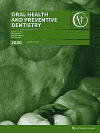Comparison of Remineralising Potential of Nano Silver Fluoride, Silver Diamine Fluoride and Sodium Fluoride Varnish on Artificial Caries: An In Vitro Study
Oral Health Prev Dent 17 (2019), No. 5 (18.10.2019)
Page 469-477, doi:10.3290/j.ohpd.a42739, PubMed:31268047
Purpose: To evaluate the remineralisation effect of an experimental nano
silver fluoride (NSF) formulation using an in vitro remineralisation
model, compared with silver diamine fluoride (SDF) and sodium fluoride
varnish (NaF) in current clinical use.Page 469-477, doi:10.3290/j.ohpd.a42739, PubMed:31268047
Materials and Methods: 45 sound human third molars were sectioned in buccolingual and mesiodistal direction and 180 enamel specimens were divided into four groups (NSF; SDF; NaF; Control). Early caries-like lesions were artificially created. Remineralisation agents were applied with a microbrush for 2 min in NSF and SDF group; NaF varnish were applied in a thin layer and then all specimens were stored in a moist environment at 37°C for 24 h. Each group was subjected to a pH cycling model for 7 days. The Vickers microhardness values (VHN) of specimens were compared before treatment, after demineralisation and after remineralisation. In addition, scanning electron microscope (SEM) images were investigated to compare morphological changes on the surfaces. Kruskal-Wallis and Mann-Whitney U tests were used for statistical analysis to compare the groups at p < 0.05.
Results: All remineralisation agents were found to be statistically significant for the rehardening of the demineralised enamel specimens (p < 0.001). There was a statistically significant difference between the all groups after remineralisation (p < 0.001). The VHN values for postdemineralisation were determined as, respectively, NaF (229.96) > SDF (222.96) > NSF (191.36) > Control (175.80). SEM images have also supported the microhardness values.
Conclusions: NSF was not found to be effective as sodium fluoride varnish and SDF on artificial enamel caries lesions. Additional investigation is needed to recommend it as an alternative agent to routine fluoride treatments.

Comments